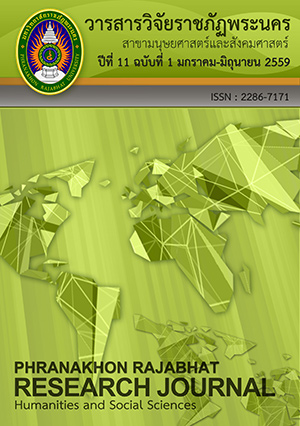คุณสมบัติของคำเชื่อมอนุพากย์ ที่มาจากคำบอกอดีตกาลในภาษาไทยและภาษาเวียดนาม The properties of conjunctive participle in Thai and Vietnamese
Main Article Content
บทคัดย่อ
THE PROPERTIES OF CONJUNCTIVE PARTICIPLE IN THAI AND VIETNAMESE
งานวิจัยนี้มีจุดมุ่งหมายเพื่อศึกษาคุณสมบัติทางความหมายและไวยากรณ์ของคำว่า "แล้ว" ที่ใช้
ในการเชื่อมอนุพากย์ในภาษาไทย ศึกษาและวิเคราะห์คำละ (empty categories) ที่เกิดขึ้นในอนุพากย์
ที่ประกอบด้วยคำว่า "แล้ว" และศึกษาคุณสมบัติเหล่านี้ของคำเชื่อมอนุพากย์ "rôi" ในภาษาเวียดนาม
การศึกษานี้ได้ทดสอบทฤษฎีทางวากยสัมพันธ์ที่ใช้อธิบายการกระจาย (distribution) และการตีความ
(interpretation) คำละในอนุพากย์ "แล้ว" ในภาษาไทย และอนุพากย์ "rôi" ในภาษาเวียดนาม โดยเก็บ
ข้อมูลประโยคที่ประกอบด้วยคำว่า "แล้ว" จากผู้พูดภาษาไทยและบทความต่าง ๆ ในหนังสือพิมพ์มติชน
มติชนสุดสัปดาห์ และหนังสือพิมพ์เนชั่นรายสัปดาห์ แล้วนำประโยคเหล่านี้มาวิเคราะห์และตีความรวมทั้ง
แปลเป็นภาษาเวียดนามโดยเจ้าของภาษา
ผลการศึกษาพบว่า คำว่า "แล้ว" ในภาษาไทยและ "rôi" ในภาษาเวียดนามปรากฏในอนุพากย์
ที่ทำหน้าที่เหมือนวิเศษณ์วลี (adverbial phrase) อนุพากย์ที่แสดงการกระทำต่อเนื่อง อนุพากย์ที่แสดง
การกระทำที่เกิดขึ้นทันทีทันใด และอนุพากย์แสดงการกระทำที่บอกเหตุผลเกี่ยวเนื่องกัน
สำหรับอนุพากย์ที่บอกการกระทำที่ต่อเนื่องกัน ในอนุพากย์ "แล้ว" ในภาษาไทยและอนุพากย์
"rôi" ในภาษาเวียดนามการกระทำในอนุพากย์เหล่านี้ เป็นการกระทำที่เกิดขึ้นก่อนอนุพากย์หลัก
นอกจากนี้ ยังพบว่าอนุพากย์ "แล้ว" ในภาษาไทยและอนุพากย์ "rôi" ในภาษาเวียดนาม
ไม่ต้องการคำนามปรากฏรูป (overt noun phrase) ในตำแหน่งประธานของอนุพากย์ หากประธานของ
อนุพากย์ "แล้ว" และ "rôi" เป็นตัวเดียวกับประธานในอนุพากย์หลัก คุณสมบัติเช่นนี้แสดงให้เห็น
ว่าประธานของ อนุพากย์ "แล้ว" และอนุพากย์ "rôi" นั้นเป็นคำละ เนื่องจากไม่อนุญาตให้คำนามปรากฏรูป
อยู่ในตำแหน่งประธานของอนุพากย์ได้โดยสามารถอธิบายปรากฏการณ์เช่นนี้ได้ ตามทฤษฎีไวยากรณ์
เพิ่มพูน (generative grammar) ว่าอนุพากย์เหล่านี้เป็นอนุพากย์ที่ไม่มีกาล
อย่างไรก็ตามในบางโครงสร้างพบว่า อนุพากย์ "แล้ว" ในภาษาไทยยอมให้มีประธานปรากฏรูป
อยู่ในอนุพากย์ได้ ไม่สามารถใช้ไวยากรณ์ของชอมสกี้ (Chomsky’s generative grammar) มาอธิบายได้
โดยไม่มีการแก้ไขเพิ่มเติม เนื่องจากทฤษฎีไวยากรณ์เพิ่มพูนมีกฎเกณฑ์และคำอธิบายที่จำกัดในการนำมา
ประยุกต์เพื่อวิเคราะห์อนุพากย์ที่มีคุณสมบัติเช่นนี้ในภาษาไทยและภาษาอื่น ๆ
This research looks at the syntactic and semantic properties of /laew/ in Thai and
examines empty categories in the construction that /laew/ occurred compared to those
in /rôi/ construction in Vietnamese. It is also aimed to verify some syntactic theories used
to explain the distribution and interpretation of empty categories occurred in both /laew/
and /rôi/ construction.
The data are collected from Thai native speakers and various articles published
in Matichon daily newspapers, Matichon Weekly and Nation Weekly magazines. The data
are also collected from Vietnamese native speakers in order to analyze the syntactic and
semantic properties of /rôi/ and then compare to those of /laew/ in Thai.
This research fnds that both /laew/ and /rôi/ clauses function like adverbial phrase
showing continued, sudden and causal action. /laew/ clause and /rôi/ clause also show
related action which the action in /laew/ clause occurs before that in matrix clause.
It is also found that the overt subject is not allowed in /laew/ clause and /rôi/
clause in case that the subject in both clauses and that in matrix clause are the same. It is
also assumed that the subject in both /laew/ clause and /rôi/ clause are empty categories
because any overt subjects are not allowed in the subject position of both clauses. This
phenomenon can also be explained according to the theories of generative grammar that
both /laew/ clause and /rôi/clause are tenseless clauses.
However, this research fnds that /laew/ structure in Thai can also allow overt
subject occurring in its clause if the subject in /laew/ clause and that in matrix clause are
different. Therefore, /laew/ construction in Thai cannot completely explained by Chomsky’s whole generative grammar without any further modifcation because the generative
grammar has some limited principles and explanation which cannot be used to analyze
some clauses whose properties are like those in /laew/ clause in Thai.
Article Details
บทความที่ได้รับการตีพิมพ์เป็นลิขสิทธิ์ของมหาวิทยาลัยราชภัฏพระนคร
ข้อความที่ปรากฏในบทความแต่ละเรื่องในวารสารวิจัยราชภัฏพระนครเล่มนี้เป็นความคิดเห็นส่วนตัวของผู้เขียนแต่ละท่านไม่เกี่ยวข้องกับมหาวิทยาลัยราชภัฏพระนคร และคณาจารย์ท่านอื่นๆในมหาวิทยาลัยฯ แต่อย่างใด ความรับผิดชอบองค์ประกอบทั้งหมดของบทความแต่ละเรื่องเป็นของผู้เขียนแต่ละท่าน หากมีความผิดพลาดใดๆ ผู้เขียนแต่ละท่านจะรับผิดชอบบทความของตนเองแต่ผู้เดียว


